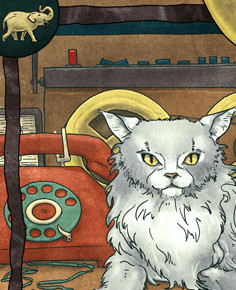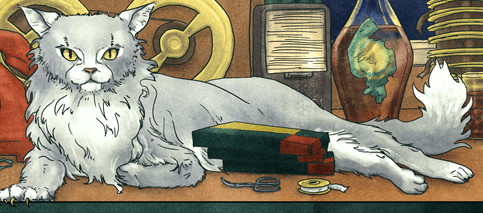Imagine a cat in Russia, specifically, one hailing from the historic city of Leningrad. Forget the romanticized images of Russian felines from classic literature – the wise, talking cats dispensing folksy advice or charming intellectual circles. This is reality, where cats don’t engage in philosophical debates or ride public transport. More importantly, in reality, cats don’t talk.
This particular cat is a quintessential Leningrad resident, a mature feline settled into his life but not yet nearing his end. He has spent his entire existence with a stern, elderly woman. She was the archetypal Leningrad native, instantly recognizing tourists and newcomers by their demeanor, and not hesitant to correct their direction-seeking attempts with a sharp tap of her umbrella. Now, this old lady has passed away, leaving the cat in a state of bewildered uncertainty.
On one paw, a dignified farewell for the old lady seems appropriate – a funeral with somber music, a priest, and the traditional rites. However, the cat, with a pragmatic understanding of the world, anticipates the likely outcome. News of her passing would undoubtedly attract distant relatives from remote areas, all eager to claim her valuable property – a centrally located apartment on Nevskiy Prospekt, no less. The aging cat would be promptly evicted, left to fend for himself on the streets.
Driven by a strong survival instinct and aversion to becoming a stray, the cat swiftly overcomes his initial hesitation. He formulates a plan and begins to put it into action.
The old lady’s past profession as a radio announcer provides the crucial tools for his scheme. Two rooms in her apartment are overflowing with reels of Svema brand 6mm magnetic tape, countless hours of archived broadcasts. “It’s midnight in Petropavlovsk… Today’s news includes… We are taking your calls… Broadcasting live across the Soviet Union… The first exercise for today’s radio calisthenics is…” A vintage Aurora reel-to-reel tape player holds a prominent position in the living room.
The old lady was an avid listener of these recordings, playing them at all hours and at high volume due to her declining hearing. These blasts from the Soviet past became involuntary daily concerts for her neighbors. So accustomed did they become to these sonic relics that some struggled to sleep without them, even banging on the heating pipes on unusually quiet nights.
The cat, naturally, was a captive member of this audience. He absorbed the broadcasts, his memory retaining vast amounts of the recordings. He could have easily served as a prompter for any radio announcer.
The old lady’s refined nature suggested her feline companion was no ordinary, simple creature. He was a well-bred, intelligent cat, likely capable of wielding an umbrella against uncouth tourists himself, were it physically possible. However, the pesky laws of physics, unfortunately, apply to felines too, preventing him from effectively grasping an umbrella.
However, miniature manicure scissors were a different matter. Those, he could manage.
Thus, armed with manicure scissors, the Svema tapes, and a bottle of concentrated vinegar, the cat embarked on his ambitious endeavor.
The task was monumental. Consider the challenges: devising a plan, navigating through piles of tape reels, and executing everything from memory, as feline paws are ill-suited for holding pens or pencils. Even for humans with opposable thumbs, tasks like loading paper into a typewriter and manually returning the carriage after each line are cumbersome.
But the cat possessed an exceptional memory. He could identify every deceased relative of the old lady from her photo albums and recall the price of milk for every year since 1963, despite being born much later in 2000. (Had he belonged to a less discerning human, he might have been cursed with a name like “Millennium.” Fortunately, the old lady had too much taste for such a moniker.)
He began by meticulously sorting and organizing the numerous tape reels. A natural neat freak, the cat felt a mix of exhilaration and guilt at being in charge of the apartment. He aspired to clean it and live in a more human-like manner, yet the laws of physics remained a persistent obstacle, making truly human-like living an almost inhuman effort for a cat. And so, the arduous work began.
Tape by tape, he loaded them into the player. He listened intently, selecting excerpts, precisely cutting the tapes with the manicure scissors, and skillfully splicing them together using vinegar as adhesive. This would be a demanding task even for a human. Yet, the cat persevered. He was, after all, a Leningrad cat, not some mere feline from a less significant place. He managed to assemble a coherent-sounding audio montage by piecing together the chosen fragments. The entire process took him just under two days.
The old lady’s body was beginning to emit an unpleasant odor.
His next objective was to relocate the Aurora player and the telephone closer to each other. The telephone, an old rotary model, hung on the wall in the hallway, next to a dilapidated ballpoint pen dangling from a string. The wall itself was a palimpsest of faded phone numbers and names in varying scripts – from youthful, flowing handwriting to the shaky scrawl of age. Numbers long disconnected, names that had migrated from phone directories to tombstones in local cemeteries over the decades.
This was no lightweight modern plastic phone; it was a hefty rotary antique, weighing perhaps two to three times the cat’s own weight. Dragging this bulky device across the apartment to the living room was a considerable feat, navigating around porcelain elephants, stacks of books on Soviet radio history, and knitted doilies – relics from the old lady’s aunt’s college days.
Finally, he reached the player and established the connection.
Alt text: A tan cat stands on its hind legs on a table, reaching up to manipulate a rotary phone receiver next to a reel-to-reel tape player in a cluttered apartment setting.
He dialed a funeral home and played a pre-recorded message in the old lady’s voice, arranging the funeral services. The message contained a blend of instructions, veiled threats, and an offer of a bribe – the cat correctly estimated the old lady’s savings would suffice for such a purpose.
Neither the Aurora player nor the cat’s understanding of human nature failed him.
That night, undertakers arrived with a coffin. The front door was left ajar, and the old lady was prepared, dressed in her finest attire. An envelope filled with cash rested on the bedside table. The cat remained hidden behind a wardrobe, scraping his claws against the parquet floor, creating a subtly unsettling sound.
The undertakers collected the body and departed. The old lady received a burial on the city outskirts. No orchestra played mournful tunes, no priest swung a censer, but it was a respectable burial nonetheless, complete with a decent headstone, albeit bearing a somewhat foreign-sounding, unfamiliar name.
Later, having had time to reflect, the undertakers considered returning to the now-empty apartment to search for valuables. However, upon their return, they found the door locked. From within, the unpleasant scraping of claws against parquet echoed, followed by the stern, unmistakable voice of the old woman, hinting at potential criminal prosecution. They hastily retreated.
Alone again, the cat set about cleaning the apartment. He meticulously organized the tapes, arranged books on shelves, and dusted the porcelain elephants. He drew the line at floor washing; even for a Leningrad cat, there were limits.
For several months, the cat lived a life of relative luxury. He indulged in his favorite recordings each evening, ate as much cat food as he desired, and occasionally treated himself to a frozen sausage from the refrigerator or a saucer of a cognac-and-valerian-root cocktail. He was well-provided for. The old lady, a survivor of the Siege of Leningrad, had stocked every available space not occupied by tapes, books, and porcelain elephants with canned goods, including a generous supply of cat food.
Despite his careful planning and execution, his downfall came from something utterly mundane.
Over the months following the old lady’s death, her mailbox overflowed with junk mail, the kind of trivial advertisements Remarque lamented from the World War I trenches. While not offers for stinging-nettle trench caps, the flyers and letters were equally useless to both the deceased old lady and the cat. The mail carrier noticed the accumulating mail. She raised the alarm, summoning the neighbors. Together, they began incessantly ringing the doorbell.
The cat, naturally, did not answer. He was in the midst of editing together a suitable tape response but lacked the time. He played a random recording on the Aurora, but all the mail carrier and neighbors heard through the muffled sound was what they interpreted as the old lady’s cry for help.
They called the police.
When a policeman arrived, he found the door slightly ajar. From inside, he heard a cheerful voice, “Come in, officer.”
The policeman entered, followed hesitantly by the neighbors. However, the cat appeared at the doorway, hissing menacingly until they retreated.
The policeman proceeded into the living room, with the cat following close behind.
As the policeman searched for the old lady, the cat jumped onto a table and began operating the Aurora player. He loaded various tapes, playing phrases he had hastily arranged into a confession.
Initially, the policeman was too bewildered to fully comprehend the audio. He was utterly astounded by the cat’s performance; over the months, the feline had become so proficient at controlling the tape player that he could have become a YouTube sensation.
The cat patiently rewound the tapes and played the confession again.
This time, the policeman listened.
When the confession concluded for the second time, the policeman coughed nervously and spoke politely, his voice slightly hoarse. He requested a strong drink and asked if he could sit down, explaining that his legs were trembling.
The cat gestured towards the cognac bottle, as if saying, “Help yourself. Make yourself at home.” He considered joining the policeman for a drink but decided it might be too much for the officer to process at that moment.
After a few drinks, the policeman regained some composure. With trembling hands, he lit a cigarette, and the cat promptly brought him an ashtray.
The cat answered the policeman’s questions by playing recordings and, when necessary, quickly cutting and splicing new tape segments, further shocking the officer, if that were even possible.
Two hours later, the policeman emerged from the apartment.
He instructed the neighbors to disperse and gently reprimanded the mail carrier for her excessive concern for the old lady, suggesting she focus on delivering packages to those eagerly awaiting them.
From that day forward, the policeman took it upon himself to personally empty the mailbox once a month.
He became a regular visitor to the cat, bringing treats and cognac. He found the cat to be an exceptionally attentive listener, occasionally interjecting with a clever remark in the old lady’s voice, proving to be a better confidant than any psychotherapist. Sometimes, the two of them would get drunk and sing old Soviet songs on the balcony.
The end.
Perhaps this ending is somewhat anticlimactic. As someone familiar with Russian literature and the works of Tolstoy and Dostoevsky, you might have envisioned a more dramatic destiny for the Leningrad cat. You might have pictured him wandering along the Moika River, reciting poetry on the Anichkov Bridge – original poems, perhaps, imbued with references to Remarque, Rimbaud, and another “R” writer.
Maybe you imagined him finding work as a tram conductor, then hijacking the tram and driving it to Arkhangelsk, where he would be recruited as a skipper for a North Pole expedition. Upon his eventual return to Leningrad, he would find the city too changed for his liking and head to Pulkovo Airport. He might briefly get lost in the terminal’s maze but narrowly make his flight to Paris by chasing the plane down the runway and leaping onto the landing gear. Only to discover the plane wasn’t headed for Paris but somewhere like Uryupinsk. He’d then hijack the plane again, rerouting it to Australia…
But it’s important to remember this isn’t a fairy tale. It’s a true story about a real cat. This cat has no interest in the action and adventure that writers and readers might project onto him. He couldn’t care less about trams, expeditions, Australia, or, especially, jumping onto the landing gear of a moving airplane.
Instead, the cat is content to curl up beside the record player each night. He presses play, closes his eyes, and listens to the old lady’s voice as she cheerfully announces the next song requested by listeners.
Alt text: A tan cat is curled up asleep next to a vintage reel-to-reel tape player, bathed in warm lamplight in a cozy, cluttered room.


 copy cat solo
copy cat solo